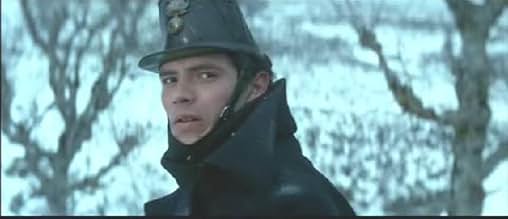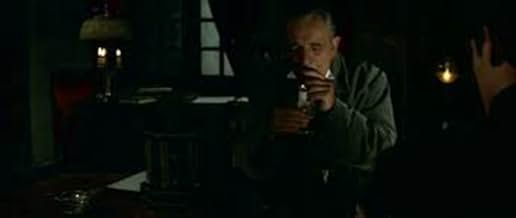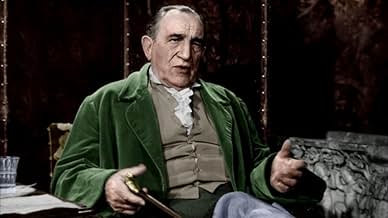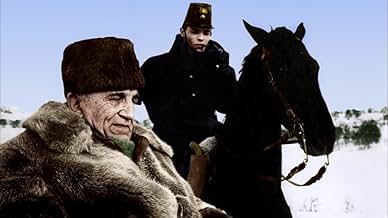Adicionar um enredo no seu idiomaA policeman and a serial killer play cat and mouse in an isolated mountain village in Nineteenth century France.A policeman and a serial killer play cat and mouse in an isolated mountain village in Nineteenth century France.A policeman and a serial killer play cat and mouse in an isolated mountain village in Nineteenth century France.
Avaliações em destaque
Giono's script simplifies the complex plot of the original, but then a film script is not a novel; the new version of "Un roi" is close to perfect in cinematic terms, combining elements of a thriller with the study of a mind collapsing slowly under the pressures of loneliness and isolation. The images, even in the grander scenes such as the wolf hunt, avoid melodrama in favour of a gradual build-up of tension. Most memorable is the astonishing use of occasional colour in the essentially monochromatic snowscapes, particularly the great red star of blood splashed across the snow. An unjustly neglected masterpiece, currently (and for many years) unavailable in any form.
The mood was captivating. The setting was magnificent. But what the hell happened in the last twenty minutes!!!
I think that it's difficult translating idea-driven literature into two-hour long films. In this case, I felt as if I was watching a half-remembered dream and hearing a half-forgotten play. Doesn't work. That's why adapting Shakespeare to films is a futile exercise because Shakespeare is about words whereas a film is about images. You can either have words, or you can have images, but you certainly can't have both.
I think that it's difficult translating idea-driven literature into two-hour long films. In this case, I felt as if I was watching a half-remembered dream and hearing a half-forgotten play. Doesn't work. That's why adapting Shakespeare to films is a futile exercise because Shakespeare is about words whereas a film is about images. You can either have words, or you can have images, but you certainly can't have both.
"Un roi sans divertissement" is a highly unusual French film based on a book written by famous French writer Jean Giono who was born in Manosque,France.He also took part in the writing of the film.I got a chance to see this film when it was shown at an annual cinema event created for the restoration of old films "Rencontres Internationales du Cinéma de Vincennes" 2006 at Vincennes near Paris.A new restored version of this film was shown at Vincennes in the presence of its director François Leterrier.Although this film is a prolific murder mystery,the best thing about it is its depiction of rural life in France.Each character appears lost as if something has happened to the world around.We see how ordinary people go about their normal lives despite the fact that killings have occurred in their midst.It must be stated that "Un roi sans divertissement" succeeds because it shows more of human character then a simple murder mystery.We get to have a first hand vision of why people kill.The film has more or less remained faithful to the original book "Un roi sans divertissement". This is something which makes this film an outstanding work which is hard to classify in the realm of French cinema. This is one of the good reasons to watch this film as not many good novels have been made into good films.
I have just seen a french DVD copy of this film. It is one of the most interesting thrillers I've seen in along time. The visuals are astonishing and the dialogues are as sophisticated as you would expect from someone like Giono. The concept is fascinating: a policeman and a serial killer play cat and mouse in an isolated mountain village in Nineteenth century France. Unlike most thrillers, there is no psychological explanation of the killer's motives, but a metaphysical, existential reflection of the nature of murder, which can be considered highly original, and at least as immoral as De Quincey's thesis.
It is clear that this film was a heavy influence on Chistophe Gans' "Brotherhood of the wolf", although I would suggest that the unexpected (yet totally coherent) twist at the ending has been copied in many films such as Friedkin's "Cruising" (francophile smart ass!) or Von Trier's "Element of crime".
It is clear that this film was a heavy influence on Chistophe Gans' "Brotherhood of the wolf", although I would suggest that the unexpected (yet totally coherent) twist at the ending has been copied in many films such as Friedkin's "Cruising" (francophile smart ass!) or Von Trier's "Element of crime".
I was unfortunate to see this after I read the actual book, and it was a huge disappointment.. The story is different, the plot overly simplistic, most of the characters have lost their depth and complexity and charm. In some cases they have literally been changed. The entire message is spelled out all too clearly.
The weird thing is that the author Jean Giono actually wrote the script. I really don't understand what made him destroy his own book like this. Because it's a decent enough book, with some good points and and interesting story.
No. I didn't like it at all.
The weird thing is that the author Jean Giono actually wrote the script. I really don't understand what made him destroy his own book like this. Because it's a decent enough book, with some good points and and interesting story.
No. I didn't like it at all.
Você sabia?
- CuriosidadesHaving made friends with Jean Giono, Édouard Molinaro was asked by the writer to co-write and direct the film. They did write a first draft of the script and went as far as to scout locations in the Aubrac region but the project failed for production reasons. François Leterrier took over two years later.
- Trilhas sonorasPourquoi faut-il que les Hommes s'Ennuient ?
Music by Jacques Brel
Lyrics by Jacques Brel
Performed by Jacques Brel
Principais escolhas
Faça login para avaliar e ver a lista de recomendações personalizadas
Detalhes
- Data de lançamento
- País de origem
- Idioma
- Também conhecido como
- A King Without Distraction
- Locações de filme
- Les Hermaux, Lozère, França(village where the action is set)
- Empresa de produção
- Consulte mais créditos da empresa na IMDbPro
- Tempo de duração
- 1 h 25 min(85 min)
- Proporção
- 2.35 : 1
Contribua para esta página
Sugerir uma alteração ou adicionar conteúdo ausente










